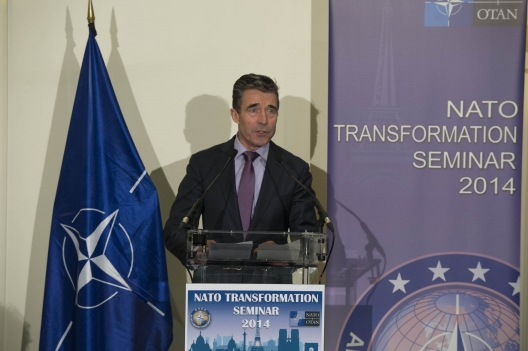 We are meeting at a defining moment for the security architecture we have built together over the last decades. Events in Eastern Ukraine are of great concern. I urge Russia to to step back. Any further move into Eastern Ukraine would represent a serious escalation, rather than the de-escalation that we all seek. We call on Russia to pull back the tens of thousands of troops it has massed on Ukraine’s borders, engage in a genuine dialogue with the Ukrainian authorities, and respect its international commitments.
We are meeting at a defining moment for the security architecture we have built together over the last decades. Events in Eastern Ukraine are of great concern. I urge Russia to to step back. Any further move into Eastern Ukraine would represent a serious escalation, rather than the de-escalation that we all seek. We call on Russia to pull back the tens of thousands of troops it has massed on Ukraine’s borders, engage in a genuine dialogue with the Ukrainian authorities, and respect its international commitments.
This crisis raises serious questions for Euro-Atlantic security.
Now is the time for the right answers. And let me put forward three answers which I see as key for our Wales Summit in September.
We must prepare a readiness action plan.
We must reinvest in our defence.
And we must reinforce the transatlantic bond.
So first, we must stand ready at all times to safeguard the security of all Allies. To deter and defend against any attack. To deal with the unexpected. And to address the arc of crises around our borders with our network of partners around the world.
Because from Sevastopol to Syria and the Sahel, we are facing a dangerous world. Where threats are complex, unpredictable and interconnected. Newer challenges, such as terrorism, failed states, cyber and missile attacks. And old challenges in new guises, such as attempts to redraw borders by force.
We must develop an action plan to strengthen our readiness. And this requires the right training, the right posture, and the right capabilities.
First, training and exercising. This is about our people and platforms being properly prepared. Exercised together. Trained together. And ready to be deployed together – wherever and whenever required.
We must continue to build on our Connected Forces Initiative to exercise more frequently and with more forces. We must exercise all scenarios, including collective defence. We must rehearse reinforcement. This involves not just the dispatch and deployment of forces, but also ensuring they have what they need when they arrive. And we must exercise in the places where we may expect to deploy, not just in military training areas. As Allies, and together with partners.
The second element in a readiness action plan is the NATO Response Force. We have it, and we must use it. To do that, we should place parts of it at very high readiness.
But this is not enough. We must review the readiness of all our forces. To ensure that we can act within reduced warning times. Of course, you cannot react quickly if you are not in the right place. So we must also review where we place our forces. How we posture them. And how we redeploy them rapidly when necessary. And all this needs to be underpinned with the appropriate defence plans prepared and ready to use.
The third element for improved readiness is improved capabilities.
We need to procure the high-end capabilities that we currently lack – joint intelligence, surveillance and reconnaissance; missile defence; air command and control; and air lift. Much work has already been done to fill these gaps. But we need to advance and expand our programmes.
Of course readiness has a cost. But if we’re not ready for whatever the future brings, we place our security at risk. And the costs of insecurity are much higher.
This leads me to my second point. This crisis has shown that we cannot take our security for granted. So we must be ready to pay the price to preserve it.
Over the past years, some of our European Allies have cut their defence spending by as much as 40 %. While other countries, like Russia, are increasing theirs by 30 %.
The reality is that Europeans have disarmed too much and for too long. In NATO, we have agreed a defence spending guideline of 2% of Gross Domestic Product. Too few Allies meet this guideline. And too many have moved too far in the other direction. This is the time to stop the cuts and start reversing the trend.
I am not naive. I know defence spending will not increase overnight. But we cannot have effective collective security without collective commitment.
Excerpt from speech by NATO Secretary General Anders Fogh Rasmussen in Paris, April 8, 2014.
Image: NATO Secretary General Anders Fogh Rasmussen, April 8, 2014 (photo: NATO)
